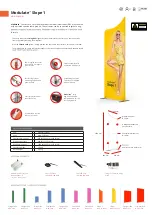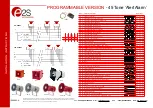
14
EN
GENERAL NOTIONS FOR PREPARING
COFFEE
When the machine has reached its
operating pressure, 1.2 - 1.5 bar which
may be checked by looking at the upper
scale in the pressure gauge (part 3 fig.
1, 2 or 3), and its operating temperature
at the same time, with the body/group
already at infusion temperature, the filter
holder and filter must be heated more
since they are at the lowest position of
the group itself, and they are partially
isolated from the same due to the rubber
gasket between them. This operation may
be carried out by activating the paddle
(fig. 2, part 1) or the switches (part 5, fig.
1 or 3) and keeping them in the brewing
position for approx. 45 seconds, at which
point they must be turned off and you
must wait for 2-3 more minutes.
During this time, the pointer of the lower
scale of the pressure gauge (part 3, fig.
1 or 3; or fig. 2, part 4) may reach as
high as 11-12 bar; this may occur any
time that, while activating the groups,
the motor pump forces cold water into
the coffee boiler at a pressure of 8-9 bar
and, simultaneously, the PID controller
regulating the temperature of the boiler
itself switches on the heating elements
in order to bring the water contained in
such boiler up to operating temperature.
However, in this case it is necessary to
adjust the expansion valve (marked 19A in
fig. 4) in such a way that the pressure may
never exceed 12 bar.
The size of the coffee granules is extremely
important in preparing a good cup of
coffee, as is the type of coffee mix used.
The ideal grind can be determined by
making various coffees using the amount
of ground coffee that you would normally
use for each cup (we recommend at least
7 g). The best grind is that which allows
coffee to flow out from the filter holder
spouts neither too slowly nor too quickly.
IMPORTANT
The temperature of the water in the
coffee boiler, and therefore of the groups,
may eventually be raised or decreased by
means of the PID temperature controller
(part 22, fig.4) - see next chapter for
further details. The final adjustment
should be made during tuning-up, once
the machine has been permanently
installed. The pressure of the water on
the coffee during the brewing is very
important. For this reason it is important
to set the by-pass on the pump at 9 bar.
This value changes if there are variations
on the incoming pressure from your local
water system. If there are variations,
make the necessary technical adjustments
on the system in order to eliminate them.
Summary of Contents for Linea
Page 23: ...EN...









































